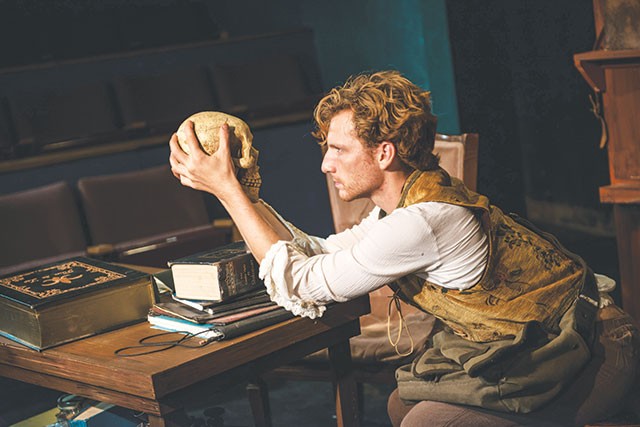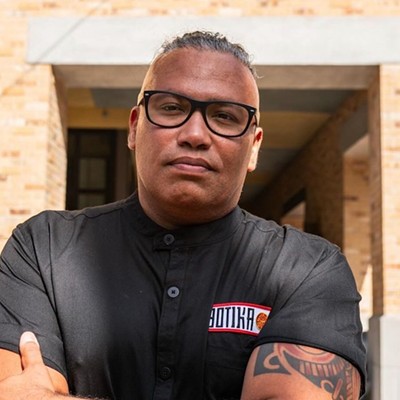Before returning to Elsinore for the wedding of his mother and his uncle, Hamlet was a student in Wittenberg. Martin Luther, a professor of theology there, launched the Protestant Reformation by posting 95 Theses on a local church. The inspired premise behind Wittenberg, David Davalos’ scintillating drama of ideas and verbal pyrotechnics, is that Hamlet might have been a student of Luther in 1517. He borrows Christopher Marlowe’s Faustus (as in, the scholar who sells his soul to the devil for knowledge) to serve as faculty foil to Luther. The vacillating Prince of Denmark is torn between majoring in theology and philosophy. Professor Luther offers a path of piety: “Let an abiding faith steer you.” Dr. Faustus advises Hamlet: “Question everything.”
In its published form, Wittenberg seems like a Platonic dialogue translated by S.J. Perelman. A reader can linger over literary allusions and clever puns (Lascivious Helen asks Faustus whether his protégé is Swedish. He replies that Hamlet is Danish. Helen: “I love danish in the morning.”). But director Bill Gundry and a gifted cast demonstrate how much more zestful the play can be on stage.
The playwright himself takes on the role of restless skeptic Faustus. It is said that the devil gets all the best tunes, and Davalos’ Faustus, whom Luther calls satanic, gets to sing the only songs— three numbers, including an uproarious but plangent rendition of “Que Sera, Sera”—in The Bunghole, a campus pub. Davalos conveys the nuances of an irreverent, witty teacher, scholar and satyr who chafes at the limits of being human. “Above all, think for yourself,” Faustus tells Hamlet. Davalos’ Faustus is an affectionate portrait of a plucky freethinker in an age very like our own (evolution, climate change, etc.) when Copernicus’ theory of the solar system flirted with heresy.
Andrew Thornton, a lauded veteran of local productions and Davalos’ classmate when both attended Churchill High School, plays Luther as a devout but constipated Christian who is goaded by Faustus into breaking with the Church over indulgences and purgatory. While Luther, preaching, recites Song of Songs, the most erotic book of the Bible, Faustus and Helen put the text into practice. Embodying what Goethe called “the eternal feminine,” Christina Casella plays several women, ranging from a saucy serving wench and the wanton proto-feminist Helen to the Virgin Mary. Sam Mandelbaum’s Hamlet is an earnest undergraduate whose angst is exacerbated by uneasy dreams. His tennis match with an offstage Laertes anticipates a duel that concludes a more famous play.
“You write the drama of your life, not some unseen hand,” Faustus assures Hamlet. Shakespeare’s hand wrote the play that Hamlet will reenter. But the hand that wrote Wittenberg can—and should—be seen playing Faustus. This smart and sassy production compels the audience to smack its own hands together, in applause.
Wittenberg
$10-$25
8pm Fri-Sat, 3pm and 8pm Sun
Cellar Theater
San Pedro Playhouse
800 W Ashby
(210) 733-7258
theplayhouseSA.org
Through Nov 17


















